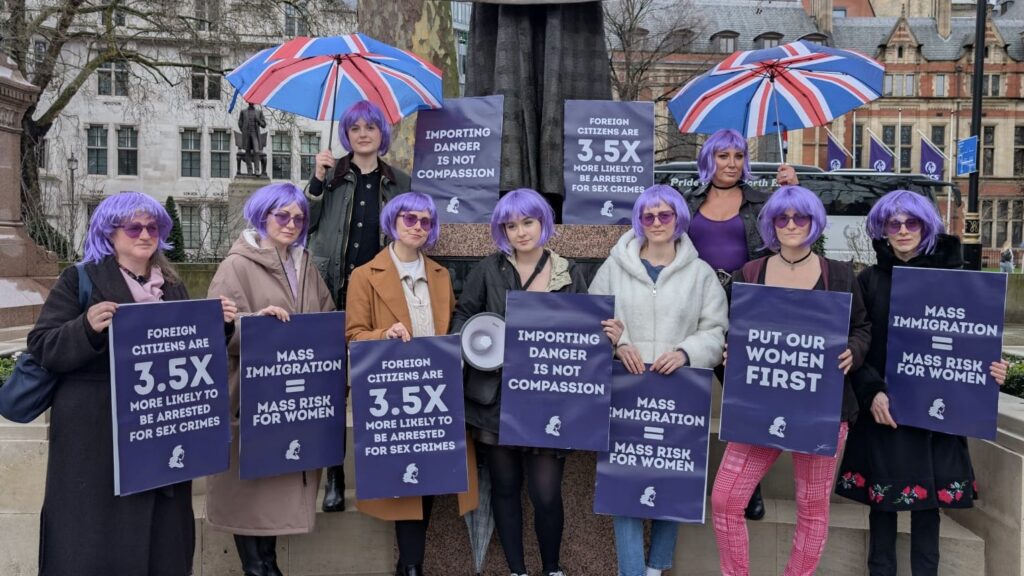James Graham is a Senior Researcher at the London, United Kingdom-based conservative think tank Prosperity Institute, formerly Legatum Institute. His professional focus is financial freedoms. Additionally, he has held a leadership role in the Conservative Christian Fellowship, with a particular focus on increasing youth engagement. Mr Graham was gracious enough to visit us and give an exclusive interview to our website.
***
The United Kingdom has been in the news a lot lately with the passing of the Online Safety Act. I’m not even sure if you are aware of this, but according to your biography on the MCC website, financial privacy is one of your expertise. As somebody for financial freedom, I’m assuming you are not happy with this new legislation.
No, I’m not. Freedom in the United Kingdom has been under attack for a long time. Even though this new act is disturbing, it’s the latest in a long litany of assaults on free speech in Britain. We have a lady in Britain named Lucy Connolly who has been in prison for almost a year, for a post on X which the authorities deemed to be stirring up hatred. But this Online Safety Act does pose a heightened threat on a scale that has not yet been seen. British citizens are now unable to access content online, relating to their own country, unless they’re willing to hand over their data to large tech firms.
One example of this came shortly after the Online Safety Act came into force. A sitting Member of Parliament, Katie Lam, had a speech she gave in Parliament censored. We have a scandal in the United Kingdom in relation to Muslim rape gangs, where there have been groups of men, mainly of Pakistani Muslim origin, raping young white British girls. Katie Lam read out—in Parliament, the mother of democracy—the court transcripts detailing some of the experiences of the young British girls. This is deeply in the British public interest. It was restricted on major social media platforms because it violated the conditions of the Online Safety Act. This is not sustainable in a free democratic society. And the more the government tries to shut down any critique of its management of issues which the public deeply care about, the more backlash there will be.
‘The more the government tries to shut down any critique of its management of issues which the public deeply care about, the more backlash there will be’
The aims of the act are noble insofar as they want to limit childhood access to pornography, which is clearly a terrible thing. However, unfortunately, the wording of the act, which goes along the lines of ‘limiting content likely to cause distress to children,’ opens the scope so widely that it’s incumbent upon tech firms to be incredibly risk averse, leading to what we have witnessed in just the two weeks since it’s been active—mass censorship.
Has its constitutionality been adjudicated, or is there a way to challenge it in court and have the High Court strike it down for violating free speech?
In Britain parliament is sovereign. Therefore, constitutionally, now that this law has been enacted, there is little that can be done. We must hold our MPs to account for their violation of Britain’s free speech tradition that dates back to the 1689 British Bill of Rights and beyond. However, we are now in a culture in Britain where free speech is viewed with suspicion, and the state has been keen to shut down any opposition. We need a government of the right to overturn this terrible law and reassert free speech in British law.
Britain has also been in the global news for being the first country to sign a trade agreement with President Trump under his second term. Were you satisfied with the agreement that your country signed with the United States?

Yes, I think it’s a wonderful start, and it shows the strong affection between Great Britain and the United States and the strength of their special relationship. I think there’s still work to be done, and obviously we want to move to a zero-tariff situation. It’s highly advantageous that we have lower tariffs than the rest of Europe. What this trade deal does highlight is the value of Britain having regained its sovereignty through the process of Brexit. I believe that the United States and Great Britain have a strong future together, but this is currently being put at risk by the British government’s focus on realignment with the European Union and with European standards, which risk undermining some of what has been achieved.
Did the United Kingdom get a better trade deal from the US than what the EU just got about a week ago?
Yes, they did. So I believe that the tariffs on the United Kingdom are 10 per cent, whereas for the European Union, they’re 15 per cent. And the UK has more exemptions. So we do have a better deal and a competitive advantage.
So, Brexit has worked out in a way?
Absolutely. Great Britain has wanted for years to achieve a trade deal with the United States. It was impossible whilst we were in the European Union because we had handed over our negotiating power to unelected bureaucrats in Brussels. Now we have reclaimed that power. We are trying to make the most of it, but we do need to keep moving further.
Your other area of expertise is Diversity, Equity, and Inclusion (DEI) and Environmental, social, and governance (ESG). I’m actually more familiar with DEI, but you asked to talk about ESG. Can you explain broadly to the audience and me what ESG is?
Sure. So, ESG is a concept that has been around for a while, but became popular in the aftermath of the financial crash in 2008, when many financial institutions wanted to sanitize their reputation. E stands for environmental, S for social, and G for governance. ESG is a framework that has been lobbied for by big financial firms, implemented by the regulators, and managed by what we call rating agencies which rank different companies according to their environmental, social, and governance standards.
However, the purpose of companies is profit — returning profit to shareholders, who are usually pensioners and people who are working hard and saving hard. But ESG undermines the goal of achieving profit by forcing companies to pursue, first of all, environmental goals, through net-zero ambitions, which are harmful and rejected by most people in Britain, as reflected in recent political polling. Then there are social goals, which are linked to DEI—which you have referenced—and that leads to the promotion of people who aren’t necessarily the best qualified, but who meet certain genetic characteristics. That’s obviously not the way we should be promoting or selecting talent.
The governance element is interesting, because governance in itself is a good thing—it’s the bedrock of good companies and successful organizations. However, ESG has even corrupted good governance. Their interpretation of it is something they describe as ‘active ownership’. Active ownership is when large financial firms—for example, BlackRock—claim ownership of all the shares they manage, even though the real owners are the underlying investors. They claim to speak on their behalf while lobbying the companies in question to pursue ESG aims.
So, for example, recently we had British Petroleum (BP) seeking to ditch its net-zero agenda and to pivot back towards gas and oil, which is obviously a good thing for prosperity. We need energy abundance. Yet many of the major asset managers voted against BP and opposed BP’s attempt to reprioritize profit through oil and gas. This is clearly in violation of shareholders’ interests—and in violation of prosperity.
Well, in the United States, you could be prosecuted for this.
Absolutely. In the United States, you have fiduciary duty—you have fiduciary laws—and many states have actually blacklisted certain companies and investment firms that engage in ESG, because it deprioritizes the interests of families and individuals who are saving and putting away a nest egg for the future. Unfortunately, in Britain and in the European Union, we don’t yet have such strict laws around fiduciary duty.
Do you think there is a public will in the UK to increase oil production in the country?
Absolutely. Britain’s greatest resource, in terms of natural resources, is its oil and gas. We have enough gas under our feet in Britain, some say, to power us for the next thousand years. It’s cheap, it’s abundant, and it’s our path to prosperity. But rather than drilling for it, we are building windmills. We are vandalizing our countryside with solar farms, all of which are subsidized by the taxpayer, and which add to British energy bills.
‘Britain only contributes 1 per cent of global carbon emissions. So everything we are doing is essentially a vanity project’
The alternative is gas and oil, which private companies will bring up, costing the taxpayer nothing. Yet the government is refusing to allow this, because it is committed to the net-zero agenda. And let me just say, the British people are reasonable people. And they really care for their countryside and our environment. However, there’s nothing green and environmental about the current agenda, which is importing steel and turbines from China, cluttering our countryside, and essentially not even reducing carbon emissions in any significant way. Britain only contributes 1 per cent of global carbon emissions. So everything we are doing is essentially a vanity project.
The British people, when polled, do support action on climate change. But as soon as you introduce a trade-off — for example: ‘Do you support action on climate change if it means paying more to fill up your car with petrol?’ — then they begin to say, ‘No, we don’t.’ And the reality is that we haven’t been honest with the British people—or, rather, the governing class hasn’t been honest about the trade-off. They pretend that we can be both reliant on so-called green energy and have prosperity. We can’t—we have to choose.
I asked this same question of Radomir Tylecote, also from the Prosperity Institute. I’m just letting you know that he said yes. So the question is: after the local council elections in the UK in May—where the major parties came in third and fourth—can they actually go extinct? Can the Conservative and Labour parties eventually lose all their seats in Parliament and cease to exist, going the way of the Whig Party, both in the UK and the US?
Yes, I think it's quite possible. It's hard to know now what will happen. The election is still a few years away. However, for the last number of decades, both of the major parties in Britain have violated the social contract repeatedly. The British people, by and large, do not support mass migration and the net-zero climate agenda, which is bankrupting Britain. The Conservatives are beginning to talk about these issues. However, in the mind of the public, Reform is the only party that hasn’t been tainted. The Labour party has shown itself unable to challenge public sector groupthink, and now has a challenger to its left. There's still time to see how this will play out, but the rejection of the established parties as a trend probably won't go away in British politics anytime soon.
Do you think the Reform Party has a good chance of actually forming government on their own, or in a coalition with the Conservative Party?
I think, based on some current trends, yes. The challenge will be that they have never fought an election at that scale before. That will be hard for them, but it's doable. We don't know what the Conservative Party will look like in three years, whether they will adopt genuinely conservative policies and convince the public that those policies are truly for the betterment of Britain and the British people. If they manage to do that, the situation could be different. But yes, right now Reform stands a real chance. The established parties, rather than belittling Reform, should take a long hard look at themselves and start questioning the orthodoxies which they have been supporting for years, and which have failed time and time again.

Would a Reform government be the end of this ESG, DEI, sort of woke agenda within the government, or do you think it could find a way to live on and maybe come back?
Let me be clear, ESG is bad. However, if individual companies choose, out of their free will, to engage in ESG, that's fine. And investors can choose to invest or divest so long as they have the proper information. But what I hope Reform would do is strip ESG and woke capitalism out of government regulation, out of British law, and that they would remove the incentives on companies to engage in this kind of behaviour. But that is a huge task; the British state is a mammoth that will do everything it can to protect itself. So Reform needs to be ready for that fight.
Related articles:







